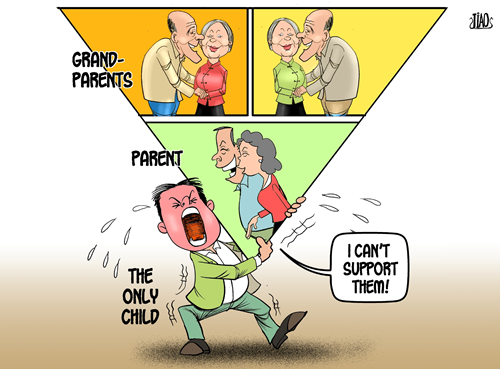China's renaissance requires new family planning
- By Mu Guangzong
 0 Comment(s)
0 Comment(s) Print
Print E-mail China.org.cn, November 18, 2014
E-mail China.org.cn, November 18, 2014
The practice of population control since 1980 has shown that the disadvantages of opting for single-child families in society seriously outweigh the advantages. In a situation where the population is continuously in the red and is losing balance, the family planning policy is in urgent need of a fundamental change of direction. The reasons are as follows:
|
|
|
Inverted pyramid [By Jiao Haiyang/China.org.cn] |
First, the enforced single-child family system has caused a gender imbalance. Since the 1980s, the gender ratio at birth has continued to increase, far beyond the normal range of 103-107. In loss of millions of female population, millions of males are unable to exercise their marriage rights. Besides, a surplus of young males may cause a threat to social stability.
Second, for single child families, the aging problem and the "empty nest" phenomenon are seriously weakening family care of the elderly. As a result, the elderly are finding it difficult to get care and connect with their families. By 2050, the number of elderly in empty homes without their children beside them may reach 79 million. "Dying lonely in empty home," which is often reported in the press, may become a normal phenomenon.
Third, from the point of view of society, a smaller younger generation, aging and the generation gap are causing a pensions gap. If there is a financial crisis, there could be an extensive pension crisis. Besides, "aging before getting rich" means that many elderly people may get into the predicament of low-level care for them, which is actually a care of just clothes and food and even less. In rural areas where there are a number of elderly people with no young people to support them, a crisis of humanity may occur. The pressure on public finances for elderly care provided by the state will keep increasing in the coming years.






